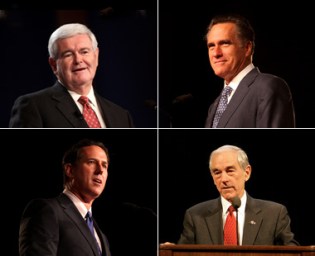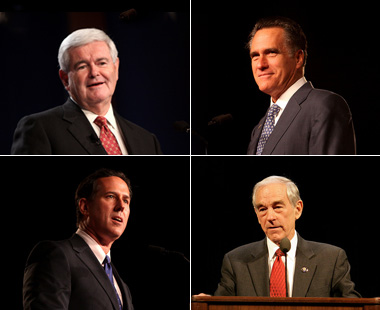
Photos by Gage Skidmore.
How times change. Four years ago, a Washington Post op-ed gushed that the Democratic primary had turned into “a sharp competition among the leading candidates to become champions of urban America.” Skip ahead to the 2012 Republican primaries, and cities are getting dissed. Big time.
The national Conference of Mayors is having its annual meeting in Washington this weekend. Newt Gingrich, Mitt Romney, and Rick Perry were all invited. Romney said he had a scheduling conflict. (OK, fair’s fair: The South Carolina primary is a legitimate excuse — but he couldn’t swing by Sunday? Oh, right.) The other two didn’t even bother to reply. The chorus seemed to be: “Cities — who needs ’em?”
Truth be told, cities won’t likely decide this election. America is still firmly rooted in the suburbs. (Emily Badger wrote in The Atlantic Cities last week that both Romney and President Obama have drawn most of their campaign cash from the “moneyed ’burbs.”) But this is just the latest in decades of insults slung at cities by Republicans in Washington.
“The core of the Republican constituency in metropolitan America are the growing, racially and economically exclusive ‘outer suburbs’ whose privileged status Republicans seek to protect at all costs,” former Albuquerque Mayor David Rusk told Daniel Denvir in his excellent primer on the subject for Salon.
But the Republicans currently taking pot shots at each other in the presidential primary never cease to surprise. While there has been almost no mention of urban policy on the campaign trail, a look at their sordid pasts reveals that (surprise!) some of them have actually had some sensible ideas over the years, albeit often grounded in some pretty weird logic. Here’s a quick peek.
Mitt Romney
As governor of Massachusetts, Romney pulled together state housing, transportation, and environmental agencies to create a united front focused on smart growth. That triumvirate sounds familiar if you’ve read our story about President Obama’s Sustainable Communities initiative. As with health care, once upon a time Romney out Obama-ed Obama. (Just please, don’t remind him; under the hawk-like gaze of Gingrich and Santorum, he’d probably rather not think about it.)
Still, the example suggests that as a businessman, Romney understands the value of breaking down silos and getting agencies working together. He also has hereditary roots in urban development: Romney’s father was secretary of the Department of Housing and Urban Development under Richard Nixon. He may have houses scattered across the countryside, but he can roll with the city folks.
Since his days as governor, of course, Romney has changed his tune on a lot of things (not least the climate and energy). He has taken up the mantle of domestic energy production, calling, notably, for fast-tracking the Keystone oil pipeline. (Didn’t happen.)
And there was the time as governor that Romney wanted to take his official SUV to a photo op at a new transit-friendly development (as told by Alec MacGillis in the New Republic). So it’s entirely possible all the smart-growthy talk really was just a dog-and-pony show to keep the New England liberals he served at the time at bay.
Rick Santorum
Don’t hate Santorum because he lives in the ’burbs and campaigns in a Dodge RAM pickup truck — hate him for this comment: “I don’t want to make black people’s lives better by giving them somebody else’s money.”
Still, even Santorum shows some small glimmers of urban intelligence. As a senator, he was a fan of the U.S. Department of Housing and Urban Development and worked on the issues of poverty and homelessness. Matt Dellinger writes in Transportation Nation that he helped create a program that helped welfare recipients access mass transit as a means of getting to work.
Of course, the urbanists among us will blanch at the fact that the program, called the Job Access and Reverse Commute program, was designed to take people who live in cities to work in the suburbs. But given the fact that most of the job growth in the past decade has been in the suburbs, Santorum may score a few points for being a realist on this one.
He loses those points plus a few thousand more when he opens his mouth on the topics of locking up nonviolent drug offenders (“The federal government doesn’t do that”), ending poverty (Americans should suffer more in the Christian tradition, and besides, if everyone just graduated from high school and got married, “poverty would be no more”), or, god forbid, climate change.
Newt Gingrich
Here’s a guy with a lot of sympathy for folks in the hood: Gingrich once suggested that we rewrite child labor laws so that kids could work as school janitors. “Really poor children in really poor neighborhoods have no habits of working and have nobody around them who works,” he said. “They have no habit of ‘I do this and you give me cash,’ unless it’s illegal.”
Honestly, it’s hard to find anything to love about Newt and his stance on urban issues (though he finds himself plenty lovable). As part of his 1994 Contract with America, Gingrich championed the “Taking Back Our Streets Act” that would have addressed urban crime with the subtle and intuitive approach of simply locking up and executing more people. Since then, he has done an about face, joining a group called Right on Crime that pushes for prison reform from a conservative angle. Why? It costs too much to keep all those criminals locked up.
It’s difficult to tell where Newt stands on transportation. He skipped voting on the biggest transit bills of the ’90s. We have to rely on Newt’s rhetoric, and luckily for us, Newt loves to talk. As recently as 2009, Newt called for a national high-speed rail network, saying, “If you want to be the most competitive country in the world in 2040 or 2050, you have to think large.”
Sounds pretty good, eh? But wait. The man who once said he’d like to “go head-to-head with the Chinese” on developing high-speed magnetic levitation trains recently suggested that subways are for fancy people.
Ron Paul
On the one hand, Ron Paul has a lot of cred with young voters and is a maverick when it comes to issues like marijuana legalization (he thinks states should decide whether it’s legal or not), the death penalty (he says he no longer supports it), and the Patriot Act (he was one of three Republicans to vote against it). On the other, he’s Ron Paul. Paul’s take on most issues is rooted in a healthy dose of states’ rights and the gold standard — so it’s probably unfair to expect a charitable approach to federal spending on urban renewal.
Still, sometimes he talks a good game. He seems to believe, for example, that the free market would favor mass transit over highways:
If you didn’t have government subsidized highways, at least at the federal level — and have all these wonderful superhighways sailing from city to city and downtown — there would have been a greater incentive for the market to develop transits, trains going back and forth … By subsidizing highways and destroying mass transit, we ended up with this monstrosity.
But Paul is not about to get government involved in funding transit. He once called public funding of Amtrak “fascist” and voted against increasing its funding several times.
Paul’s greatest asset in the primary is his ability to shake up the debate and stick to his often-contrarian convictions. Let’s hope sentiments like, “I think inner-city folks and minorities are punished unfairly in the war on drugs,” win out over calls to dismantle the federal government.
Of course, all this may or may not tell us anything about what these men would do as president. Lacking any real discussion of cities on the campaign trail, we’re left to read between the lines. But the echoing silence on urban issues suggests that, in all likelihood, the grand Republican tradition of ignoring American cities would continue under a new Republican president. The suburbs, on the other hand, would sure have something to cheer about.
For a look at President Obama’s record on urban policy issues, see our two-part series, here and here.



